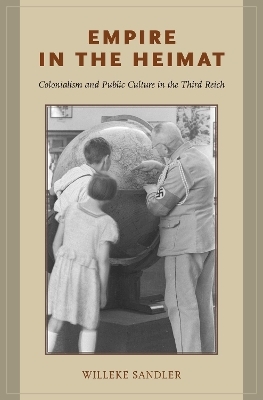
Empire in the Heimat
Oxford University Press Inc (Verlag)
978-0-19-069790-7 (ISBN)
With the end of the First World War, Germany became a "post-colonial" power. The Treaty of Versailles in 1919 transformed Germany's overseas colonies in Africa and the Pacific into League of Nations Mandates, administered by other powers. Yet a number of Germans rejected this "post-colonial" status, arguing instead that Germany was simply an interrupted colonial power and would soon reclaim these territories. With the Nazi seizure of power in 1933, irredentism seemed once again on the agenda, and these colonialist advocates actively and loudly promoted their colonial cause in the Third Reich.
Examining the domestic activities of these colonialist lobbying organizations, Empire in the Heimat demonstrates the continued place of overseas colonialism in shaping German national identity after the end of formal empire. In the Third Reich, the Deutsche Kolonialgesellschaft and the Reichskolonialbund framed Germans as having a particular aptitude for colonialism and the overseas territories as a German Heimat. As such, they sought to give overseas colonialism renewed meaning for both the present and the future of Nazi Germany. They brought this message to the German public through countless publications, exhibitions, rallies, lectures, photographs, and posters. Their public activities were met with a mix of occasional support, ambivalence, or even outright opposition from some Nazi officials, who privileged the Nazi regime's European territorial goals over colonialists' overseas goals. Colonialists' ability to navigate this obstruction and intervention reveals both the limitations and the spaces available in the public sphere under Nazism for such "special interest" discourses.
Willeke Sandler is Assistant Professor of History at Loyola University Maryland.
Acknowledgments
Abbreviations
Introduction
Chapter 1: The Stakes of Overseas Colonialism in the Weimar Republic
Chapter 2: Gleichschaltung and the Beginnings of a Mass Movement, 1933-1935
Chapter 3: Locating Germanness, Locating the Colonial: Competing Organizations and Visions of Empire
Chapter 4: Caring for Africans Here and There: Race, Place, and the Myth of the Good German Colonizer
Chapter 5: The Second Gleichschaltung in 1936
Chapter 6: The Paradox of Success, 1936-1939
Chapter 7: Seeing the Colonies: Colonialist Visual Culture, 1936-1943
Chapter 8: Africa or the East? Colonialists during the Second World War, 1939-1943
Epilogue: Echoes of Colonialism
Bibliography
Index
| Erscheinungsdatum | 21.09.2018 |
|---|---|
| Verlagsort | New York |
| Sprache | englisch |
| Maße | 239 x 160 mm |
| Gewicht | 699 g |
| Themenwelt | Geschichte ► Allgemeine Geschichte ► 1918 bis 1945 |
| Geisteswissenschaften ► Geschichte ► Regional- / Ländergeschichte | |
| Geschichte ► Teilgebiete der Geschichte ► Kulturgeschichte | |
| Geschichte ► Teilgebiete der Geschichte ► Militärgeschichte | |
| ISBN-10 | 0-19-069790-3 / 0190697903 |
| ISBN-13 | 978-0-19-069790-7 / 9780190697907 |
| Zustand | Neuware |
| Haben Sie eine Frage zum Produkt? |
aus dem Bereich


